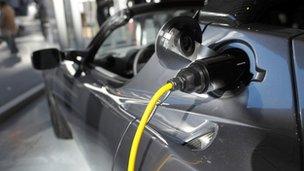Scottish government pledge to end car emissions by 2050
- Published

Anyone who buys an electric car in Scotland receives a free home charging point
The Scottish government has said it wants the country's towns and cities to be free of emissions from petrol and diesel vehicles by 2050.
It has published a "roadmap", external setting out its plans to help businesses and motorists switch to electric vehicles.
The government is to spend more than £14m over the next two years replacing its fleet of petrol and diesel vehicles with electric alternatives.
It will also install charging points at all of its main buildings.
The Switched On Scotland document was produced alongside experts from industry, academia and environmental bodies, and sets out the plan to drive forward the uptake of electric vehicles in Scotland.
Among its commitments are that by 2050, Scottish towns, cities and communities will be free from the "damaging effects" of petrol and diesel fuelled vehicles.
By 2040 almost all new vehicles sold will be near zero-emission at the tailpipe; and by 2030 half of all fossil-fuelled vehicles will be phased out of urban environments across Scotland.
Grants of up to £5,000 are available towards the purchase cost of an electric car, with up to £8,000 available for the purchase of an electric van.
Scottish households that buy an electric vehicle will also continue to receive a 100% grant for a home charging point.
The government has pledged to provide new ways of supporting motorists to adopt electric vehicles by providing expert advice on their environmental and financial benefits.
And discounted ferry fares for electric vehicles on all routes to Mull and Bute are being introduced as part of a pilot scheme.
Electric vehicle owners currently pay no road tax, with the government stating that electric cars are also cheaper to run at 2p or 3p a mile compared with 16p a mile for the average fossil-fuelled family car.
A third of all car journeys in Scotland are less than two miles long, with nearly a quarter of all trips being of one mile or less.
'Health and wellbeing'
In a regular car, these journeys are said to emit a disproportionate amount of carbon into the air, whereas electric vehicles provide a cleaner method of transport.
But Norwegian research published last year, external suggested electric cars might actually pollute much more than petrol or diesel-powered models.
Scottish Transport Minister Keith Brown said the plans to replace petrol and diesel vehicles by 2050 were a "bold vision" that would require a "transformation in how we think about moving people and goods around."
He added: "This transformation is absolutely vital to achieve our ambitious climate change targets.
"It will also help improve local air quality with a resultant improvement in public health and wellbeing and contribute toward further energising Scotland's economy through opportunities for our flourishing green technology industries and our renewable energy sector."
It later emerged the roadmap was to be revised, after Transport Scotland conceded it had included mobility scooters in figures showing an increase in the number of electric and plug-in hybrid vehicle registrations last year.
The actual number was 235 - well below the figure of 1,000 initially claimed.
And Green MSP Alison Johnstone said the Scottish government was wrong to think that electric cars were the answer to congestion and pollution problems.
She added: "There are just a tiny handful of electric cars on our roads and I see no sign that uptake is going to dramatically increase.
"More could be achieved right now by repairing our potholed roads, making streets safer for cyclists and pedestrians, and making public transport accessible for more people."
- Published11 April 2013
- Published6 February 2013